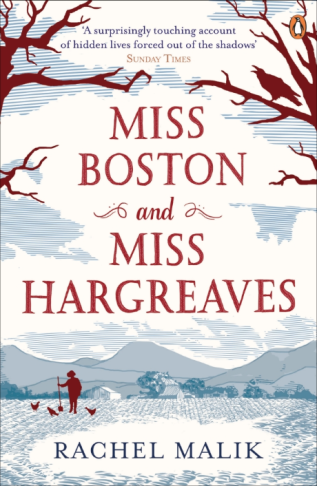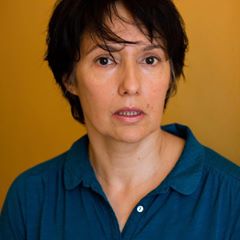
I’m just delighted to be part of the paperback launch celebrations for Miss Boston and Miss Hargreaves by Rachel Malik. I’ve been hearing so many great things about Miss Boston and Miss Hargreaves and am so thrilled to have a copy waiting for me on my TBR. Today I’m bringing you a guest post from Rachel all about wartime and the background to teh book.
Published by Penguin, Miss Boston and Miss Hargreaves is already available for purchase in ebook and hardback and will be released in paperback on 1st February 2018 here.
Miss Boston and Miss Hargreaves

One day in 1940 Rene Hargreaves walks out on her family and the city to take a position as a Land Girl at the remote Starlight farm. There she will live with and help lonely farmer Elsie Boston.
At first Elsie and Rene are unsure of one another – strangers from different worlds. But over time they each come to depend on the other. They become inseparable.
Until the day a visitor from Rene’s past arrives and their careful, secluded life is thrown into confusion. Suddenly, all they have built together is threatened. What will they do to protect themselves? And are they prepared for the consequences?
Wartime
A Guest Post by Rachel Malik
Miss Boston and Miss Hargreaves spans 20 years but the wartime setting especially important. The novel begins in the South of England in June 1940: most of France has surrendered to Germany and British soldiers have just been rescued from Dunkirk. Elsie Boston, one of the two main characters, is under no illusions about how badly the war is going. Britain faces defeat – no one can know what is going to happen. I wanted the novel to open at a moment of real uncertainty, the kind that may make characters retrench and close in on themselves or take risks they never would in ordinary life.
Elsie and Rene Hargreaves, the Land Girl who comes to work on Elsie’s smallholding, Starlight, are far from the action in some ways. Elsie has been working the land all her life – there’s no novelty for her in the work – and she’s been working alone for some years so she can teach Rene. Starlight Farm, at the top of a hill on the Lambourn Downs is relatively isolated and the two women have very little contact with other locals. This gives them a kind of freedom but they both feel part of the war effort – Rene especially (she has her reasons for this). The war is frightening but also exciting, often both at the same time.
Only last night there had been bombing, heavy enough, far enough away to have them rush out into the dark. They had climbed to the very top of the hill, and turning their backs on Lambourn and the valley, they had watched the bright come and go and heard the rumbling and spitting of the bombs like distant weather. Unable to do anything but stand and wait, they watched as a glow built slowly on the horizon – Portsmouth or Southampton … They had felt jittery and oddly excited but then a plane shrieked over Inkpen Hill….
Women’s contribution to WW2 and the Home Front in particular is now well-known. Rene and Elsie are part of this: they work hard to produce food for the country, listen attentively to the news on the wireless, take public information posters seriously. They are always on the lookout for the enemy, but the enemy isn’t always where you expect to find it. Whilst the war created new opportunities for women, it also, predictably, created anger and anxiety. In the novel, the local landowners are angered by Elsie’s independence and because she has managed to secure a Land Girl – this stokes much older resentments. In the first third of the novel, it’s the locals Rene and Elsie need to look out for.

There are wonderful films and photographs of women at work on the home front, heroic or cosy: Amazonian women driving tractors with the sun in their hair, the Women’s Institute making jam for the nation. They make great viewing and were an important part of my research but they were also the official picture, patriotic, intended to inspire, promote hard work, loyalty to the cause. In many contemporary dramas which feature Land Girls, churlish men and older women are gradually brought around. But these aren’t the only stories.

War Agricultural Executive Committees were set up in each county (‘County War Ags’), mainly made up of local landowners, to co-ordinate the agricultural war effort. Between 1941 and 1943 the National Farm Survey assessed farms throughout England and Wales for their productivity. On the basis of the results, farmers might be offered resources or required to change land-use or grow different crops. Most harshly, they could be evicted if they were thought not to be managing their land efficiently. Historians now estimate that more than 2,500 tenancies were terminated during the war (and many more farmers probably quit under pressure). Quite often, these farms were acquired by local landowners who added to their acres. The survey usually included a visit to the farm by an outside expert. In the novel Rene and Elsie prepare anxiously for this visit determined to make a good show, not knowing that he wasn’t the person who would be making the decisions …
VE day is famously captured by the footage of the celebrations in London. The energy and sheer happiness of the crowd is exhilarating, but for many the picture wasn’t so simple. Rene and Elsie spend VE day in the country. Relieved that the war is over and keen to watch people celebrate and enjoy themselves, they are also uneasy. Many changes are coming. The years after WW2 brought all manner of attempts to reassert older gender conventions. In cities there was some possibility of escape from these, but in the countryside and if you were working class it was far, far harder. Meeting by chance, because of the war, from different places and with apparently nothing in common, by 1945 Rene and Elsie have forged a powerful bond and are trying to find a new way of living. Will the future be able to accommodate them?
What a fascinating post Rachel. Thank you.
Rachel has also provided links to some amazing resources if you’d like to see more.
Resources
Try the Women’s Land Army website for lots more detailed information about the WLA and some wonderful images:
For more information on the National Farm Survey which offers a huge amount of information about the agriculture at this time and which could be an invaluable family history resource, start at here.
For more information about the evictions, see Short, Brian, Watkins, Charles, Foot, William and Kinsman, Phil The National Farm Survey, 1941-1943: State Surveillance and the Countryside in England and Wales in the Second World War.
Sarah Waters’s novel The Night Watch (2006), set between 1941 and 1947, shows the very sharp differences between wartime and the aftermath. The UK TV series The Bletchley Circle (2012 and 2014), set in 1952-3 and starring Anna Maxwell Martin, explores the struggles and confinements of post-war life for many women.
About Rachel Malik

Rachel Malik was born in London of mixed English and Pakastani heritage.She studied English at Cambridge and Linguistics at Strathclyde. For many years Rachel taught English at Middlesex University.
You an follow Rachel on Twitter @RachelMalik99 and visit her website.
There’s more with these other bloggers too:


2 thoughts on “Wartime: A Guest Post by Rachel Malik, Author of Miss Boston and Miss Hargreaves”